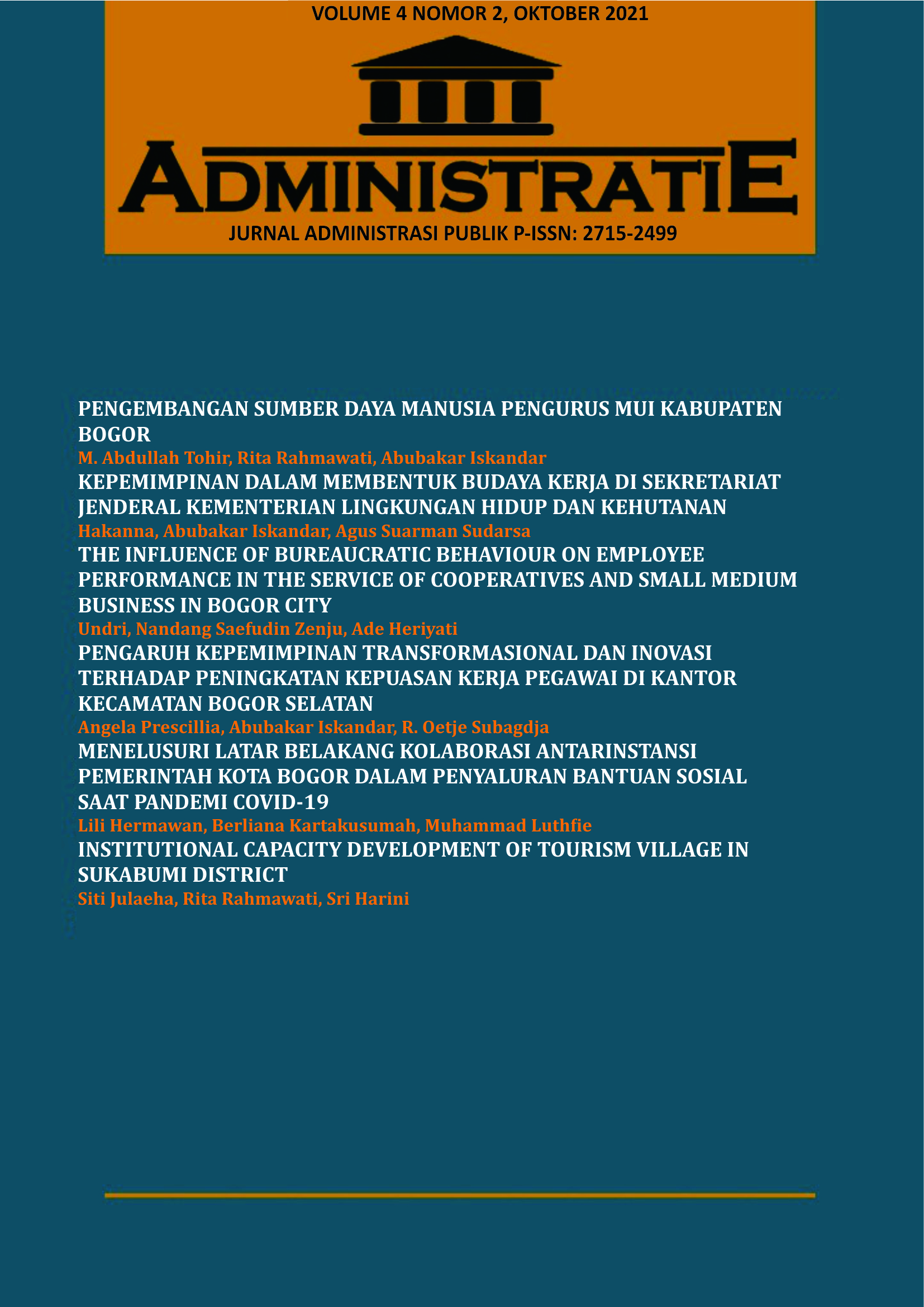INSTITUTIONAL CAPACITY DEVELOPMENT OF TOURISM VILLAGE IN SUKABUMI DISTRICT
Keywords:
Institutional, Tourist Village, Human Resource Development, Information TechnologyAbstract
This research is motivated by the potential for the development of tourist villages in Sukabumi Regency, which has not been fully maximized due to the limited role of social and cultural aspects within the community, as well as the institutional government model for managing the existing tourist destinations in Sukabumi Regency. This study aims to identify the institutional factors that either support or hinder the development of tourist villages in Sukabumi Regency. Employing a descriptive method and a qualitative approach, this research utilizes literature studies related to tourist villages, local wisdom, tourism development, and institutional capacity strengthening. The findings reveal that there are institutional factors that support the development of tourist villages. Several influencing factors include information technology, human resources, and collaboration among various stakeholders in tourism development. The recommendations from this study underscore the need to bolster the institutional capacity of tourist villages by enhancing structures with a focus on Information Technology, expanding and training human resources to cultivate skilled and innovative individuals, and progressively and intensively fostering collaborations with diverse entities, including Entrepreneurs, Academics, Media, Civil Society Organizations/Communities, and the general public.
References
Apriliani, A. (2018). Model Kemitraan Pemerintah Dan Swasta (Public-Private Partnership) Dalam Pengembangan Pariwisata Di Kabupaten Sukabumi. Universitas Djuanda.
Aprilianto, J. T., & Susilo. (2016). Analisis Peran Sektor Pariwist Terhadap Pendapatan Asli Daerah Pada Kabupaten Dan Kota Di Jawa Timur. Jurnal Ilmian Mahasiswa FEB, 5(1).
Atmoko, T. P. H. (2014). STRATEGI PENGEMBANGAN POTENSI DESA WISATA BRAJAN KABUPATEN SLEMAN. Jurnal Media Wisata, 12(2 (November)), 146–154.
Ayuni, S., Larasaty, P., Pratiwi, A. I., Meilaningsih, T., Ihsan, M., Yulianingsih, E., & Riyadi. (2021). LAPORAN PEREKONOMIAN INDONESIA. (W. P. A. P & S. Ayuni, Eds.). Badan Pusat Statistik.
Badan Pusat Statistik Provinsi Jawa Barat
Darma, I. G. K. I. P., & Rai, K. N. M. (2020). Pemulihan Fungsi Alam Pariwisata Ditengah Pandemi Covid-19. Khazanah Ilmu: Jurnal Pariwisata Dan Budaya, 11(2), 101–108.
Dewi, D. N., & Adi, S. W. (2021). ANALISIS SEKTOR PARIWISATA TERHADAP PENDAPATAN ASLI DAERAH (PAD) (Studi Empiris Pada Daerah Istimewa Yogyakarta Tahun 2012-2018). In PROSIDING SEMINAR NASIONAL EKONOMI DAN BISNIS 2021 UNIVERSITAS MUHAMMADIYAH JEMBER (pp. 702–711).
Menteri Kebudayaan Dan Pariwisata Nomor : PM.26/UM.001/MKP/2010 tentang Program Nasional Pemberdayaan Masyarakat (PNPM) Mandiri Pariwisata Melalui Desa Wisata (2010).
Menteri Kebudayaan dan Pariwisata Republik Indonesia. Peraturan MenteriKebudayaan dan Pariwisata Republik Indonesia Nomer. KM.18 / HM.001 / MKP / 2011 tentang Pedoman Program Nasional Pemberdayaan Masyarakat (PNPM) Mandiri Pariwisata (2011).
Miles, M., & Hubberman, A. (1994). Qualitative Data Analysis: An Expanded Source Book. Second Edition. USA: Publishing Company: SAGE Publications, Ltd.
Peraturan Daerah Kabupaten Sukabumi Nomor 10 tahun 2010 Tentang rencana induk pembangunan kepariwisataan daerah (RIPPARDA)
Prafitri, G. R., & Damayanti, M. (2016). Kapasitas Kelembagaan Dalam Pengembangan Desa Wisata (Studi Kasus: Desa Wisata Ketenger, Banyumas). Jurnal Pengembangan Kota, 4(1), 76. https://doi.org/10.14710/jpk.4.1.76-86
Profil Desa Cipeteuy Kecamatan Kabandungan Kabupaten Sukabumi.
Purwahita, A. A. . R. M., Wardhana, P. B. W., Ardiasa, I. K., & Winia, I. M. (2021). Dampak Covid-19 Terhadap Pariwisata Bali Ditinjau Dari Sektor Sosial , Ekonomi , Dan (Suatu Tinjauan Pustaka). Jurnal Kajian Dan Terapan Pariwisata (JKTP), 1(2), 68–80.
Putri, M. (2020). Peran Sektor Pariwisata Terhadap Pendapatan Asli Daerah (Studin Kasus Kabupaten/Kota Provinsi Sulawesi Selatan) Tahun 2014-2018. Jurnal Ilmiah Mahasiswa FEB, 8(2).
Rahim, F. (2012). Buku Pedoman Kelompok Sadar Wisata Di Destinasi Pariwisata, 56.
Sugiyono. (2013). Administrative Research Methods. Bandung: ALFABETA.
Suryani, Y. (2017). Aktivitas Sektor Pariwisata Terhadap Pendapatan Asli Daerah (PAD) Di Kota Pariaman. Jurnal Menara Ilmu, 11(76), 147–154.
Susyanti, D. W. (2013). Potensi desa melalui pariwisata pedesaan. JURNAL EKONOMI DAN BISNIS, 12(1), 33–36.
Syafi’i, M., & Suwandono, D. (2015). Perencanaan Desa Wisata Dengan Pendekatan Konsep Community Based Tourism (CBT) Di Desa Bedono, Kecamatan Sayung, Kabupaten Demak. RUANG, 1(2), 51–60.
Tou, H. J., Noer, M., & Lenggogeni, S. (2020). Pengembangan desa wisata yang berkearifan lokal sebagai bentuk pembangunan pariwisata berkelanjutan. Jurnal REKAYASA, 10(02), 95–101.
Wirateja, A. A. B. (2014). Penanganan Dampak Perkembangan Pariwisata Dalam Aspek Lingkungan Fisik, Sosial, Ekonomi dan Budaya Bali” (Suatu Tinjauan Pustaka). FORUM MANAJEMEN, 12(2).
Zakaria, F., & Suprihardjo, D. (2014). Konsep Pengembangan Kawasan Desa Wisata di Desa Bandungan Kecamatan Pakong Kabupaten Pamekasan. Teknik Pomits, 3(2), C245–C249. https://doi.org/2337-3520
Downloads
Published
How to Cite
Issue
Section
License
Copyright (c) 2021 Siti Julaeha, Rita Rahmawati, Sri Harini

This work is licensed under a Creative Commons Attribution-NonCommercial-ShareAlike 4.0 International License.
Authors who publish with Jurnal Governansi agree to the following terms:
- Authors retain copyright and grant the journal right of first publication with the work simultaneously licensed under a Creative Commons Attribution 4.0 International License that allows others to share the work with an acknowledgement of the work's authorship and initial publication in ADMINISTRTAIE.
- Authors are able to enter into separate, additional contractual arrangements for the non-exclusive distribution of the journal's published version of the work (e.g., post it to an institutional repository or publish it in a book), with an acknowledgement of its initial publication in ADMINISTRTIE.
- Authors are permitted and encouraged to post their work online (e.g., in institutional repositories or on their website) prior to and during the submission process, as it can lead to productive exchanges, as well as earlier and greater citation of published work.







